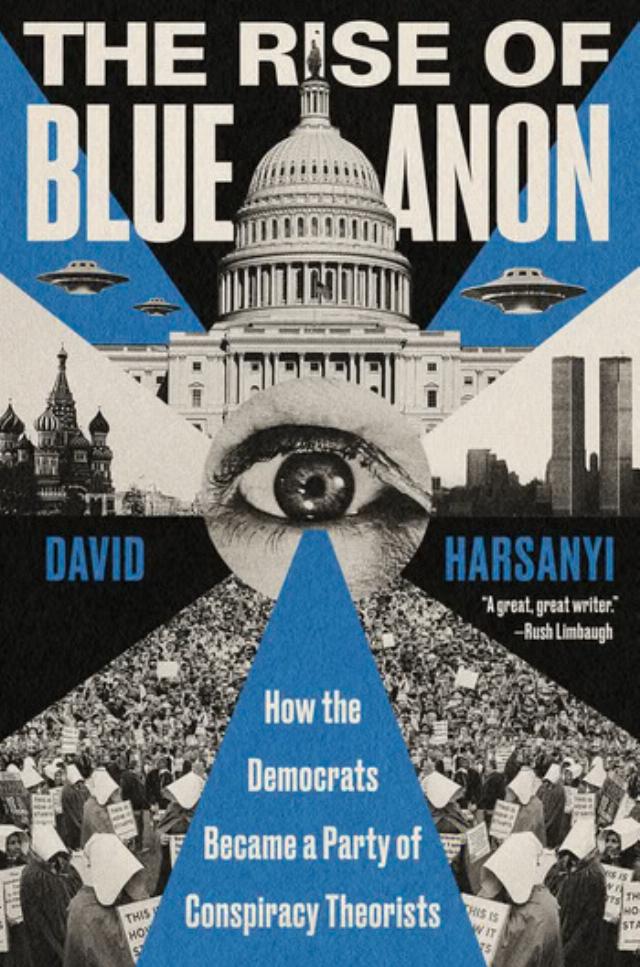We support our Publishers and Content Creators. You can view this story on their website by CLICKING HERE.
In his most recent book, The Rise of Blue Anon (the name is a take-off on the supposed right wing, Q-Anon), David Harsanyi has presented an insightful and alarming description of the current Democrat party. He doesn’t make a distinction between the Democrats and the far Left, which suggests that they have essentially become one and the same. Harsanyi explains how conspiracies have become the modus operandi for the Democrats, in almost every area of culture and politics, so that facts and the truth become incidental and inconvenient.
Early in the book, Harsanyi defines conspiracy theory:
Loosely defined, a ‘conspiracy theory’ is a belief that some influential but furtive groups are plotting or responsible for events or phenomena beyond our control. The notion is propelled by a never-ending string of disparate events and half-truths, threaded together to create a narrative that’s often impossible to disprove. These conspiracy theories, conveniently, grow with every question and every denial.
Unfortunately, the Republicans are facing a number of disadvantages with this Democrat approach. First, the Democrats are not just saying that this is the strategy they plan to use politically; they are demonstrating that they believe the conspiracies they contrive. Their beliefs have the dedication and strength of a religion, and once a conspiracy is established, it is almost indestructible. Harsanyi provides a number of examples:
Despite all this overwhelming evidence, to this day most Democrats will tell you Gore really won 2000. Basically, every major newspaper editorial board, and every left-wing columnist on their staff, still makes similar claims. Even today, you are unlikely to find any Democrats who would concede that Bush fairly won the 2000 presidential race.
Trump’s presidential victory in 2016 was unable to penetrate the Democrat delusion:
Democrats initially struggled to settle on a justification to tell the public that Trump’s election was bogus. Sure, they blamed ‘fake news’ and Fox News. They always did. This time around they also attributed the loss to left-wing media showering Trump with too much coverage. They blamed systemic racism and ‘voter suppression.’ They blamed imaginary electoral shenanigans. As they did in 2000 and 2004, ‘experts’ sat on cable news panels and deliberated on the possibility that the Democratic Party candidate ‘may have been denied’ tens of thousands of votes in battleground states like Wisconsin. It was bunk.
But then the Democrats manufactured the Russian Collusion hoax, once-respected institutions climbed on the bandwagon, and legislators assured the Democrats that the election had been stolen:
[Adam] Schiff confirmed what every Democrat wanted to hear: Congress had not only uncovered evidence of a criminal plot by the president’s 2016 campaign, but now had an ‘abundance’ of incriminating evidence in its possession. It was, of course, huge news. But it also turned out to be a spectacular lie.
Harsanyi explains some of the many areas where conspiracy theories are widely embraced by the political Left: the events of 9/11; the hearings for Brett Kavanaugh; book banning and denial of gay “rights” in the Florida schools; rumors about the Federalist Society; refusal of the Democrats to condemn anti-Semitism in the House; the list goes on. Many of the situations were familiar, but the details that Harsanyi provided presented a much more complete and ominous description of the Democrat party and their strategies.
So, what were the benefits of reading this book? It certainly was a depressing experience in many ways. After contemplating what the book had taught me (and it was filled with citations), I came to realize a number of facts.
- The delusions of conspiracy theories among Democrats are far more embedded and insidious in the United States than many people may realize.
- Conspiracy theories are nearly impossible to uproot, because they are promulgated by every type of media, our schools and universities and our legislators.
- Those who believe in conspiracy theories are oblivious to facts that contradict their beliefs. They assume the facts are contrived and false.
- Conspiracy theorists are not open to discussions or debates about their positions; they spend most of their time discrediting or name-calling their opposition.
- These people have also demonized those who are not “on their side.” The people on the right are labelled Nazis, liars, fools, haters and just about any other derogatory term you can identify.
- Many of their tenets are also rooted in Marxist theory, which suggests a long history of totalitarian belief. They don’t see the contradiction between embracing Marxism with their demands to save democracy.
This list wasn’t intended to be complete, but only a partial picture of the dominance of the Left. At least until now.
Following the 2024 national election, the cages of the Democrats were battered by a tsunami of reality. Prior to the election, Democrat hatred for conservatives, and for Donald Trump in particular, was slightly assuaged by the facts on the ground. The general population could see that the last four years of Democrat rule was deluded and destructive, and they quietly left the ranks and voted for Republicans.
The substantial question: Is the change temporary or does it have legs? Will the next four years provide enough evidence of the beneficial policies of the Republicans? Will the Democrats consider at least putting their religion aside for now, as they watch Republican policies play out?
David Harsanyi didn’t offer solutions or hope for breaking through the Democrat barriers. The chances of their letting go of their utopian illusions are likely slim; lifetime dreams are difficult to abandon. But those of us who read Harsanyi’s book are well-armed to make inroads into the challenges ahead.
Let’s hope that this Democrat “stream” of consciousness becomes a river of opportunity, and that enough Democrats will realize that life offers more than darkness and fear.

Image: Permission from author David Harsanyi

 Conservative
Conservative  Search
Search Trending
Trending Current News
Current News 


